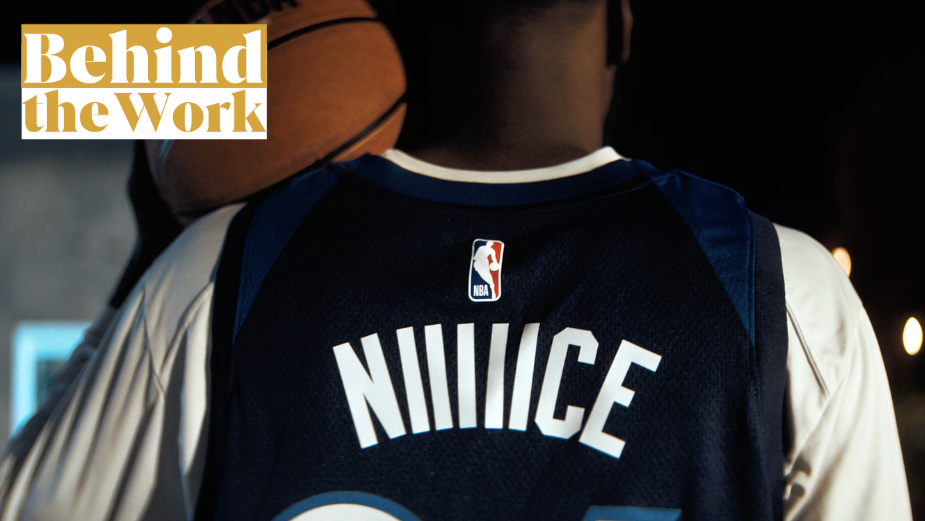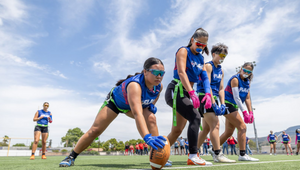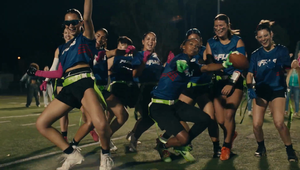
Timberwolves Spot Flips the Meaning of 'Minnesota Nice'

The phrase ‘Minnesota Nice’, synonymous with the well mannered, polite and neighbourly nature of Minnesotans has been transformed this basketball season, thanks to the first creative campaign in four years from the state’s own Minnesota Timberwolves. The community-centred spot, titled ‘Bring the Nice’ was created in partnership with independent agency, Zambezi, with production led by its production studio, FIN, and directed by fellow basketball player and sports enthusiast, Michael Medoway.
Redefining the meaning of the term, the energetic spot is fronted by rising star Anthony Edwards, as he is joined by teammates, fans and community members alike, all united by one thing – love for the Timberwolves. Bringing authenticity to the screen, the cast is composed entirely of non-actors who “lived and breathed Timberwolves”, as the spot moves from the basketball court, to local businesses, schools and beyond.
Ambitious to create a film that was centred around joy, happiness and energy, as well as cultural basketball references, Michael had to “embody the joy” he wanted to see on screen – to find out how he did just that and more, LBB’s Abi Lightfoot caught up with him.
LBB> Firstly, what attracted you to the brief, and why was this project something you were keen to get involved with?
Michael> Shooting Anthony Edwards – the new face of the NBA and the most exciting player to watch right now – was thrilling for me both as a basketball fan and as an artist. There’s a Venn diagram you can draw with basketball on one side and art on the other, and I think a big part intersects. When watching basketball on the highest level it can be high art. For this project, I wanted to make something that spoke to the Minnesota basketball heads. From casting to locations we made decisions anchored in this desire to do something for the culture.
LBB> This was the first campaign in four years for the Minnesota Timberwolves, was there an element of pressure to make sure the campaign hit the right notes for both the team and the fans?
Michael> There was an element of pressure to make sure we met the moment. Last year the Wolves exceeded expectations with Ant performing at a Jordan-esque level during their playoff run. In terms of tone, we tried to make it a fun ad that wasn’t a beat-you-over-the-head, look-how-cool-we-are sports commercial, which is kind of low-hanging fruit at a certain point. But rather, we wanted to celebrate the Timberwolves as a team and ensure it wasn’t a generalised basketball campaign, but more a crafted spot geared towards the fanbase.

LBB> Tell me more about the concept of ‘Minnesota Nice’, and how this campaign set out to redefine the meaning of the phrase?
Michael> Collaborating with Timberwolves CMO Mike Grahl and VP Heather Meyer, we talked a lot about the tone leading up to the shoot because it is a play on this commonly-used phrase ‘Minnesota Nice’. We had to walk that line of being cheeky, while also feeling authentic. We had a great creative director from Zambezi North, Jay Morrison, and Zambezi CCO Gavin Lester; I credit Gavin, Jay, and Chris Raih at Zambezi for coming up with this campaign in collaboration with the client. This was a rare alley-oop situation that I luckily walked into, to use a basketball term. The best script was already there –I just had to inject my style into it.
LBB> How did you collaborate with the client, creatives, and FIN throughout the production process?
Michael> It was a beautifully laid-out campaign from the start. I worked on fleshing out stylistic elements regarding story flow and camera work/transitions. It was an extremely collaborative environment in that the best idea in the room would win. If I offered an idea that Jay liked, it would end up in the shoot. One idea that Jay had that offered, and a huge impact in the final film, was that one player would dribble the ball and throw it into the sky. This transitioned into the final moment with Ant, as he snatches the ball and delivers his final line. Jay whispered the idea to me between takes and we went for it. That’s a great example of how the team worked. Roles melted away a little, and we all just wanted to make the best possible spot.

LBB> How did working with fans, local community members and businesses help to achieve the authentic feel of the campaign?
Michael> The beautiful part of this project was the team’s and client’s passion and willingness to do outreach. Casting was largely done as a collaboration between Zambezi and the Wolves through tapping into the fanbase, bringing people together that represented the Timberwolves in an authentic way.
We used a restaurant as talent holding, next door to the pub where we shot a scene. When I walked in to greet the cast, I felt like I stepped into a Timberwolves watch party. Our wardrobe department and I didn’t have to do anything to make the scene feel more authentic – these fans had vintage Wolves gear, both current jerseys and throwbacks, and nothing felt forced. From a stylistic standpoint, it was: walk in, start shooting. Every scene for the most part worked like that.
LBB> Following on from that, how did you set about casting for the spot, to ensure that it was representative of basketball culture and the community of fans?
Michael> They were honouring their fanbase by casting fans – real people who were diehard for the Timberwolves. The most simple example scene was at a bar where fans were watching a moment from the game and literally everyone in the bar had come wearing personal gear - sweaters, hats, scarves, T-shirts, etc. – that might have been from 20 years ago. It felt like these were people who lived and breathed Timberwolves. No one in the spot went through a traditional casting process.
We were shooting a local high school girls' basketball team, and one of the girls we featured making a jump shot is a top college prospect right now. Working with that team was a joy. Typically you have to choreograph basketball scenes to look authentic, but I could work with the coach to set up a play, and then plan our camera movement based on player movement, rather than letting the camera dictate the scene.

LBB> Your ambition was to inject as much happiness and joy into the film – how did you go about doing this?
Michael> The authenticity was there, but because they were still non-actors, you still had to pull performances from them, from the talent to the basketball players. To do that, I had to embody the joy I wanted to see on screen. I had to exude a crazy amount of energy and positivity; I tried to be the joy on set so they could feed off of me. Often, non-actors are nervous to be themselves and go all-out in the take. Part of my job is to show them it’s okay to be a bit goofy and do something you’re uncomfortable with. As a basketball player myself, I had a ball in my hand and could pull up a shot to show the talent what I wanted. I worked with defenders on how to cover the play. I was as animated as I could be to show the talent what I was looking for, instead of just sitting at a monitor.
LBB> Lastly, what were your biggest lessons or takeaways from the campaign?
Michael> You can do a lot in seven minutes. We had two lines to capture with Anthony Edwards with choreographed camera work and three separate setups. I had to explain, rehearse, and shoot lines to the camera within the seven minutes we had to shoot with him. So yes, you can do a lot in seven minutes.
















